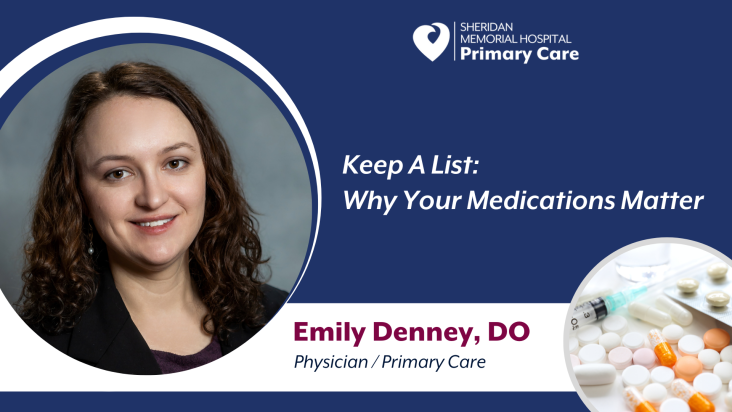By Emily Denney, DO – SMH Primary Care
As a patient there is one question you should be asked every time you see a provider: “What medications are you taking?” Often what providers are really trying to learn is what prescriptions and over-the-counter (OTC) medications, supplements, vitamins, tinctures and herbals you are taking. This question and its answers are really a big deal.
Medication dosing errors, confusion due to medications with similar names as well as supplement use can be some of the leading causes of adverse events for patients. In this growing age of multispecialty care, patients visiting multiple facilities, increasing numbers of medications and OTC supplements, the question of “What are you taking?” becomes more and more important. Every year hundreds of thousands of adverse events occur because of medication errors. More specifically, according to the New England Journal of Medicine, it is estimated that more than 20,000 emergency department visits per year are attributed to adverse events related to dietary supplements. These visits result in more than 2,000 hospitalizations annually.
Some medications have similar names, but have different uses, and there are supplements for every medical condition. It is easy to get confused with medications because of similar names such as hydroxyzine, hydralazine, and hydrochlorothiazide (three medications with very different purposes). I have had patients who thought they were taking their blood pressure medication only to realize that they had been taking another medication entirely.
Supplements, in moderation, can be a healthy tool to augment prescribed medications and support long-term health. Particularly in situations where our diet can’t meet our nutritional needs. Supplements, while considered safe on their own, can have dangerous interactions and/or side effects with some medications. St. John’s Wort, for example, is a supplement used for mood disorders, but it can cause dangerous interactions with multiple cardiac medications and antidepressants. Even vitamin D, a supplement that is frequently encouraged by most providers (including me), can interact with blood pressure medications. And if you take thyroid medication, taking calcium, magnesium or iron within four hours can weaken it. Turmeric can increase the risk of bleeding with blood thinners. Milk thistle, if taken with insulin, can dangerously lower your blood sugar.
As far as vitamins — I always think of my grandmother. She would read magazines and order supplements that were advertised to cure whatever health issue she was concerned about that day. Along with many others, she once ordered a vitamin oxygen supplement. I am still not sure what this really was or where she found it. It is also important to know where you are getting your supplements from as they are not regulated by the Food and Drug Administration, so quality standards can vary. If you aren’t sure about a supplement, ask your pharmacist or contact your doctor.
So, what can you do to help prevent adverse effects of medications and supplements interacting?
As a patient, bring in an updated list of the medications and supplements you take, or just bring all your medications to your appointments. Knowing exactly what you take can help reduce these adverse events and help your doctor provide the best care possible.
Dr. Emily Denney is a physician with Sheridan Memorial Hospital Primary Care. Prior to working in Sheridan, Denney worked in primary care for more than five years in rural Montana.
To learn more about the hospital’s Primary Care Clinic and Dr. Denney see: https://www.sheridanhospital.org/medical-services/clinics/primary-care/

